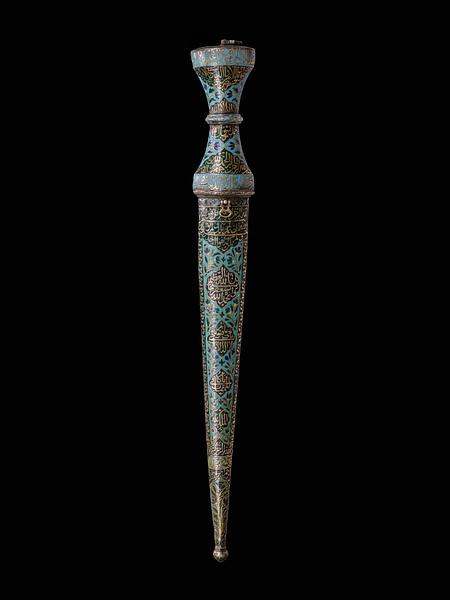Daggers with hourglass-shaped handles are known from many places in the Islamic world. This dagger has a
champlevé enamel and silver decoration that forms a uniform design across the hilt and scabbard, and the composition is the same on the front and back. Apart from a few flowering plants and plant ornaments, the dagger is completely covered with section featuring inscriptions of a religious nature. These are quotations from the Koran as well as prayers and invocations that mention Ali.
[1] Hidden on the upper side of the scabbard’s horizontal opening – and visible only when the dagger is out of its scabbard – is the engraved name of its creator: ‘Ramazan Beg son of Kalb Ali Beg’.
The dagger’s many references to Ali reveal that it must have been created in a Shiite context, and it has previously been suggested that it originated in Iran.
[2] Two other daggers with hilts of similar technique and decoration (the scabbards are lost) have also been attributed to Iran.
[3] One of these bears the date 1696. However, there is much to suggest that the entire group was instead made in the Deccan in southern India around 1700, as has also been proposed for yet another related dagger in the al-Sabbah collection;
[4] unlike the others, this latter dagger is fitted with a typical Indian hilt. Shia Islam was also widespread in the Deccan, and the region is the point of origin of another group of related metalworks generally dated to the mid- to late seventeenth century. These are begging bowls and other bowls in bronze and copper, whose decoration consists exclusively of inscriptions, often with Shiite wording (
61/1998).
[5]As regards the
champlevé technique, the Portuguese colony of Goa to the west had, from the second half of the sixteenth century onwards, served as a bridgehead for the spread of this European enamel technique on the Indian subcontinent (see
34/2019). A few silver works decorated with enamel and distinctive inscriptions such as those on this dagger have also previously been attributed to seventeenth-century Deccan.
[6]
.-The-David-Collection_Copenhagen_photo-Pernille-Klemp.jpg?locale=en)
.-The-David-Collection_Copenhagen_photo-Pernille-Klemp.jpg?locale=en)
.-The-David-Collection_Copenhagen_photo-Pernille-Klemp.jpg?locale=en)
